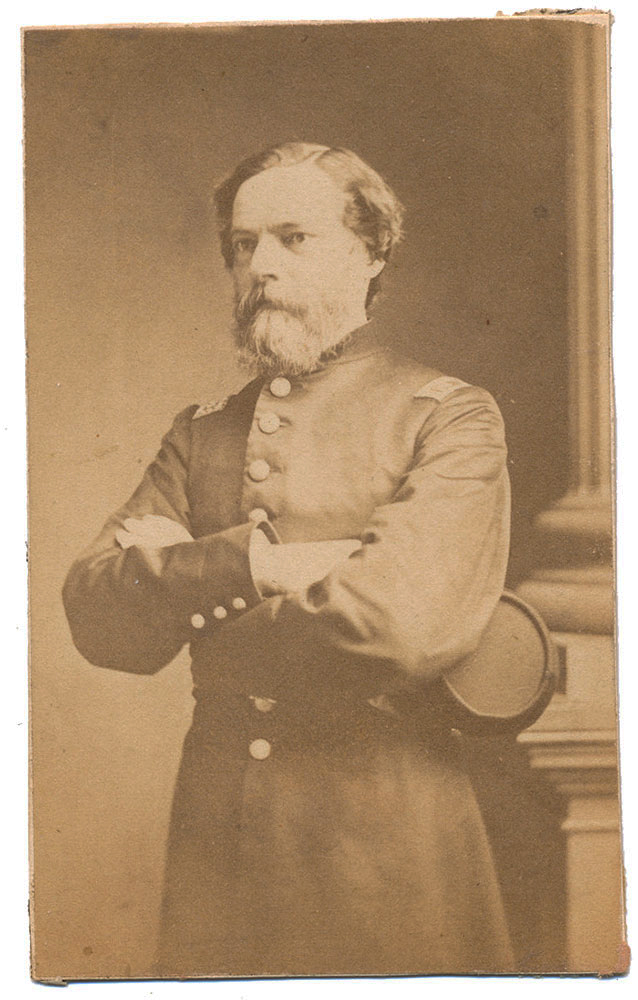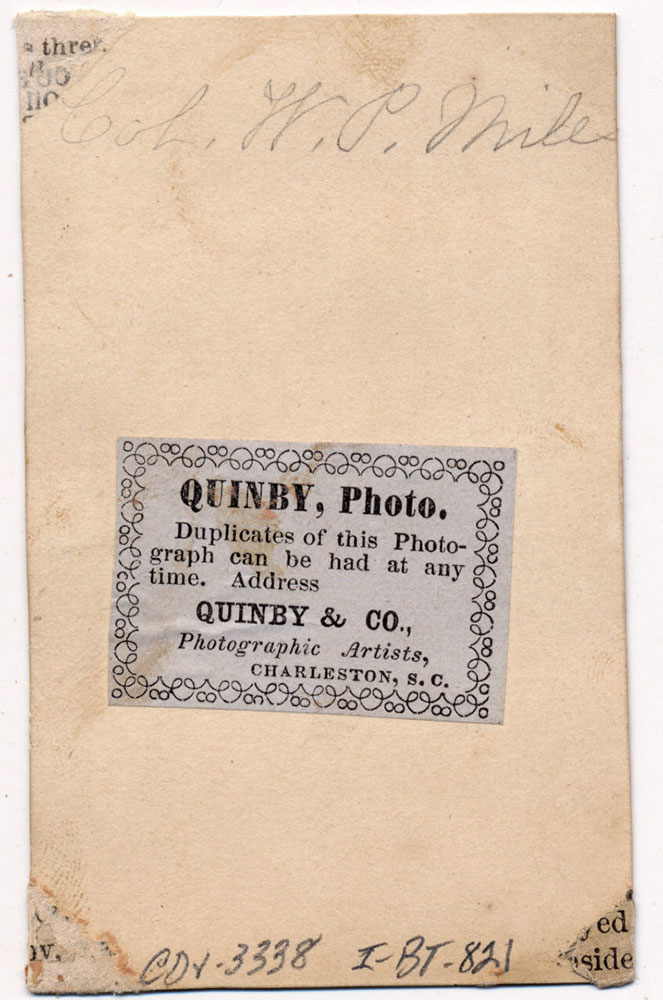site search
online catalog
CDV OF SOUTHERN FIRE EATER, LONG TIME POLITICIAN & SHORT-LIVED SOLDIER WILLIAM P. MILES - WITH CHARLESTON BACK MARK

Hover to zoom


$550.00 SOLD
Quantity Available: None
Item Code: 1138-821
Photo is a waist-up view of William Porcher Miles in medium-colored frockcoat with shoulder straps. He is posed with his arms crossed over his chest holding a kepi in his hand.
Contrast and clarity are good. Mount has been heavily trimmed along edges.
Reverse has a photographer’s paper label for QUINBY… CHARLESTON, S.C. Top has faint period pencil ID of “COL. W. P. MILES.”
Miles was born July 4, 1822 in Walterboro, South Carolina. His primary education came at Southworth School and he later attended Willington Academy. Miles enrolled at Charleston College in 1838 and graduated in 1842. He briefly studied law with a local attorney before returning to his alma mater as a mathematics professor in 1843.
Throughout the 1840s Miles showed little interest in active politics, although he did recognize that the 1846 Wilmot Proviso threatened his concepts of "southern rights, the equality of the states under the Constitution, and the honor of a slaveholding people." In 1849 Miles was invited to speak at a Fourth of July celebration in Charleston where he stated his belief that slavery was a "Divine institution," he was willing to accept differences of opinion as long as antislavery advocates returned the favor by admitting that slavery was "recognized and countenanced" by the Constitution.
In 1852 Miles delivered an address to the Alumni Society of the Charleston College that included one of the frequent arguments of the Fire-Eaters. Addressing himself to the Declaration of Independence, Miles denied the concept of inalienable rights and maintained that liberty was an "Acquired Privilege." He argued that "Men are born neither Free nor Equal" and some men were born with the innate ability to earn liberty while others were not. Government should not attempt to either "make a Statesman of him who God intended should be a Ploughman" or "bind down forever to the plough him to whom God has given a mind capable of shaping the destinies of a People." From this point on in his career, Miles rejected the political legitimacy of abolitionists and free-soilers and responded to any attempts to restrict slavery with a call for secession.
After serving as mayor of Charleston, Miles ran for Congress in 1856. In a three-way election Miles was victorious by a vote of 1,852 to 1,844 for his two opponents.
When he took office in 1857 he found that the Kansas issues dominated Congressional debate, threatened the unity of the Democratic Party and increased the growth of the Republicans. His first speech on the House floor came in 1858 and he argued the Southern position on Kansas.
Miles was re-elected in 1858. In January 1859 he spoke in support of fellow fire-eater William Lowndes Yancey in advocating the repeal of federal laws banning the African slave trade. Miles felt that the regulation of the trade should be a state function and that the national ban was an insult to Southern honor.
After John Brown’s raid on Harpers Ferry, Miles used all his influence to encourage secession among Southern Congressmen. Support for secession was strong in South Carolina even before Mr. Lincoln's election. Miles pressed the issue, urging action as opposed to simply more discussion. Miles stated, according to a July 24 newspaper account:
I am chary of seeing the South pass "resolutions". They accomplish nothing. In truth, have come to be regarded very much like the cry of "wolf". Let us resolve less and do more. I am sick at heart of the endless talk and bluster of the South. If we are in earnest let us act. Above all, I am weary of these eternal attempts to hold out the olive branch, when we ought to be preparing to grasp the sword.
Miles argued that South Carolina should "break up things generally, which any state can at any time do." He believed that the South had "all the elements of wealth, prosperity and strength, to make her a first-class power among the nations of the world" and would "lose so little and gain so much" with secession." In August Miles was struck with typhoid fever and went to New England to recover, not returning to the state until the November elections.
After the election of Mr. Lincoln, Miles returned to South Carolina and was elected as a delegate to the South Carolina secession convention. Miles was for immediate action.
The convention adopted an ordinance of secession on December 20. Miles, along with other South Carolinians, immediately resigned his seat in Congress. In the months ahead, Miles, believing in the possibility of peaceful secession, opposed precipitate action over either Fort Sumter or the Star of the West incident. In February 1861 Miles was one of eight South Carolina delegates to the Confederate Convention in Montgomery, Alabama, that established the Confederacy.
Miles was selected for both the provisional and regular Confederate Congress. He was chairman of the House Military Affairs Committee while also serving as an aide-de-camp for General P. G. T. Beauregard at both Charleston, in the buildup to the attack on Fort Sumter, and the First Battle of Bull Run. Recognizing, however, his own lack of military training, Miles focused most of his attention on his congressional duties.
While serving in the Confederate Provisional Congress, Miles chaired the "Committee on the Flag and Seal," which adopted the "Stars and Bars" flag as the national flag of the Confederacy. Miles opposed this selection because, he felt, it too much resembled, as supporters of it admitted, the old Stars and Stripes.
Miles favored his own design. When General P.G.T. Beauregard decided a more recognizable Battle Flag was needed, Miles' suggested his design. Although this design had been rejected by the committee for a national flag, it eventually became the Confederate Battle Flag, today often referred to as a "Rebel flag" or the "Southern Cross." Miles' design was later used as the canton in the second version of the national flag, nicknamed the "Stainless Banner" as well as in the third national design nicknamed the "Blood-Stained Banner".
As late as January 1865, Miles offered a resolution in Congress stating, "That we, the representatives of the people of the Confederate States, are firmly determined to continue the struggle in which we are involved until the United States shall acknowledge our independence."
For a few years after the war, he worked for his father-in-law as a factor in New Orleans. In 1867, Miles took over the management of Oak Ridge Plantation in Nelson County, Virginia. He encountered serious financial problems as a tobacco and wheat farmer, and in 1874, he unsuccessfully applied for the position of president at the new Hopkins University of Baltimore. Miles remained on the farm and helped friends like Beauregard and former Fire-Eater Robert Rhett gather materials for their own histories of the Confederacy.
In 1880, Miles was appointed president of the newly-reopened South Carolina College. After his father-in-law's death in 1882, Miles took over the family business interests and relocated to Houmas House in Ascension Parish, Louisiana, where he managed a dozen plantations. In 1892, with his son, he formed Miles Planting and Manufacturing Company of Louisiana.
Miles died on May 11, 1899 at 76 and was interred at Green Hill Cemetery in Union, West Virginia. [AD] [ph:L]
~~~~~~~~~~~~~~~~~~~~~~~~~~~~~~~~~~~
THIS ITEM, AS WITH ALL OTHER ITEMS AVAILABLE ON OUR WEB SITE,
MAY BE PURCHASED THROUGH OUR LAYAWAY PROGRAM.
CLICK HERE FOR OUR POLICIES AND TERMS.
THANK YOU!
Inquire About CDV OF SOUTHERN FIRE EATER, LONG TIME POLITICIAN & SHORT-LIVED SOLDIER WILLIAM P. MILES - WITH CHARLESTON BACK MARK
Most Popular
Historical Firearms Stolen From The National Civil War Museum In Harrisburg, Pa »
Theft From Gravesite Of Gen. John Reynolds »
Selection Of Unframed Prints By Don Troiani »
Fine Condition Brass Infantry Bugle Insignia »
Large English Bowie Knife With Sheath 1870’S – 1880’S »
Imported (Clauberg) Us Model 1860 Light Cavalry Officer's Saber »
featured item
THE FROCK COAT AND SASH OF COLONEL WILLIAM McCOMB, 14TH TENNESSEE INFANTRY – WIA SHARPSBURG & CHANCELLORSVILLE
William McComb was a Pennsylvanian by birth. At the age of 26 he moved to Tennessee here he engaged in business. When the Civil War began he enlisted in the 14th Tennessee Infantry soon rising to a 2nd Lieutenant. He fought at Cheat Mountain in 1861… (1268-047). Learn More »


